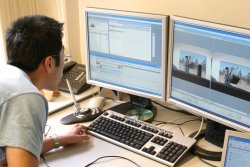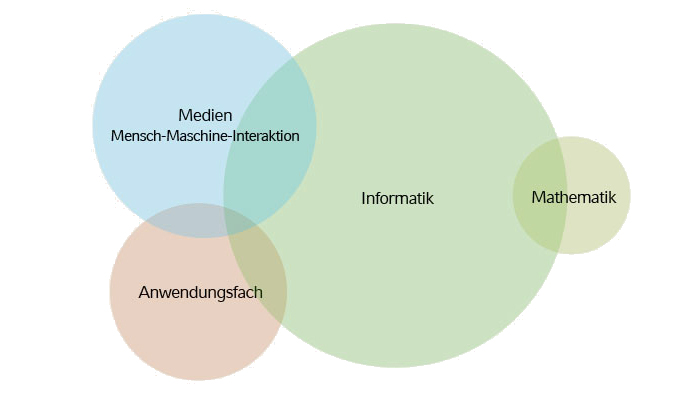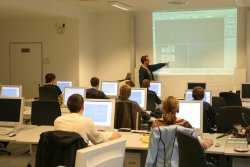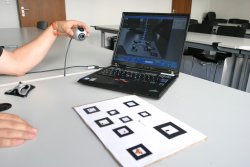Der Bachelor-Studiengang Medieninformatik
- Studieninhalte
- Vortrag zum virtuellen Campustag an der LMU
- Was ist Medieninformatik?
- So läuft das Studium ab
- Berufsmöglichkeiten
- Wir bieten
- Studienberatung
Der Bachelorstudiengang Medieninformatik umfasst 180 ECTS-Credits. Die Regelstudienzeit beträgt sechs Semester. Erfolgreichen Absolvent:innen des Bachelorstudiengangs wird von der Fakultät für Mathematik, Informatik und Statistik der akademische Grad „Bachelor of Science (B.Sc.)“ verliehen.

Studieninhalte
Das Studium der Medieninformatik ist eine Variante des Informatik-Studiums. Mit Mathematik und den Grundlagen der Informatik bilden die klassischen Elemente eines Informatik-Studiums einen wichtigen Bestandteil. Medieninformatik ist anwendungsorientierter als Informatik; damit ist gemeint, dass die Entwicklung von Anwendungen stärker im Vordergrund steht.
Der Studiengang gibt einen Überblick über Multimedia-Technologien, z.B. die Kodierung, Verarbeitung und Verbreitung audiovisueller Inhalte. Dabei bindet das Studium immer wieder Inhalte anderer Disziplinen mit ein. Es geht weniger um die Anwendung existierender Software zur Medienbearbeitung, sondern viel mehr um das Verständnis der Prinzipien dahinter und die Fähigkeit, Multimedia-Software selbst zu entwickeln.
Vortrag zum virtuellen Campustag an der LMU
.
Vorstellung der Medieninformatik an der LMU, Campustag (HTML-Player)
Vorstellung der Medieninformatik an der LMU, Campustag (MP4 Download)
Hier eine Aufzeichnung eines einführenden Vortrags zum Studium Medieninformatik:
Das Studium der Medieninformatik ist ein stark technisch-theoretisch orientiertes Studium. Kernpunkt des Studiums ist nicht die Erstellung von multimedialen Inhalten (Videos, Webseiten). Die nachfolgende Grafik zeigt die Bestandeteile, aus welchen sich der Studiengang Medieninformatik zusammensetzt.

Der Studiengang bietet viel Freiraum für Kreativität und beinhaltet auch gestalterische Elemente, jedoch stellen die Inhalte der "klassischen Informatik" einen großen Bestandteil des Studiums dar. Bitte berücksichtigen Sie diesen Sachverhalt bei der Entscheidung für diesen Studiengang.
Studierende der Medieninformatik müssen sich im Bachelorstudiengang für eines der drei Anwendungsfächer entscheiden:
- Mediengestaltung
In Zusammenarbeit mit dem Institut für Kunstpädagogik, u.a. Malen, Zeichnen, multimediales Gestalten am Computer. (Bewerbungsmappe mit künstlerischen Arbeiten erforderlich) - Medienwirtschaft
In Zusammenarbeit mit der Fakultät Betriebswirtschaft, u.a. Grundlagen der BWL, Digital Media Business, Projektseminar zu Neue Medien. - Mensch-Maschine-Interaktion
In Zusammenarbeit mit der Fakultät für Psychologie und Pädagogik und dem Institut für Statistik, u.a. Grundbegriffe der Psychologie, Human Factors in Engineering, Interaction Design.
Die Studienschwerpunkte des Bachelor-Studiengangs Medieninformatik sind:
- Informatik (ca. 45%): Grundlagenvermittlung, z.B. Softwareentwicklung, Rechnerarchitektur, Betriebssysteme, Datenbanken.
- Multimedia (ca. 25%): z.B. Medientechnik, Computergrafik, Mensch-Maschine-Interaktion, Digitale Medien.
- Anwendungsfachwissen (ca. 20%): Anwendungsfach, Praktika, Abschlussarbeiten.
- Mathematik (ca. 10%): Lineare Algebra, Analysis.
Im Masterstudium sind die Schwerpunkte Multimedia (ca. 45%), Informatik (ca. 40%) und Anwendungsfachwissen (ca. 15%). Die Wahl eines Anwendungsfachs ist im Masterstudiengang optional.
Was ist Medieninformatik?
Antworten einiger Bachelorstudent:innen:
- "Informatik, die Spaß macht."
- "Während sich die klassische Informatik auf die Kommunikation zwischen Computern konzentriert, betrachtet die Medieninformatik die Kommunikation zwischen Menschen und Computern."
- "Es geht nicht um Medien oder Medieninhalte, sondern um Konzepte zur Verarbeitung und Verbreitung von Medieninhalten."
- "Man lernt, sich Dinge selber anzueignen und sich in neue Werkzeuge selber einzuarbeiten. Es ist keine Ausbildung, bei der man lernt mit bestimmten Programmen umzugehen."
- "Wieso Medien? Digitale Medien verwenden technische Medien, um neue gesellschaftliche Medien zu schaffen."

So läuft das Studium ab
Der Studiengang Medieninformatik kann jeweils zum Wintersemester aufgenommen werden. Das Studium ist als konsekutives Bachelor-/Master-Programm aufgebaut. Im Bachelorstudium ist der Stundenplan weitgehend festgelegt. Im Masterstudium herrscht dagegen grüßere Wahlfreiheit, es ist außerdem wissenschaftlicher ausgelegt.
Der Studiengang Medieninformatik wird vom Institut für Informatik der LMU angeboten. Die Lehrveranstaltungen werden von verschiedenen, auf bestimmte Teilgebiete der Informatik spezialisierten Lehrstühlen (auch: Lehr- und Forschungseinheiten) durchgeführt. Viele speziell für den Studiengang Medieninformatik ausgelegte Lehrangebote kommen von den Lehrstühlen Medieninformatik und Mensch-Maschine-Interaktion.
Berufsmöglichkeiten
Den Absolventen:innen werden durch die praktisch-berufsorientierte und wissenschaftliche Ausbildung auf ein breites Einsatzgebiet in Forschung, Wirtschaft, Industrie, Handel, Verwaltung und dem Dienstleistungssektor vorbereitet. Mögliche Arbeitgeber sind Multimedia-Firmen, Werbeagenturen, Softwarehäuser, Telekommunikationsunternehmen, Rundfunkanstalten und Verlage, aber auch Schulungs-, EDV-, Öffentlichkeits- und Vertriebsabteilungen der meisten Unternehmen. Die Erfahrung bisherigen Absolventen:innen hat gezeigt, dass darüber hinaus auch Unternehmen aus ganz anderen Industriebereichen, z.B. die Automobilindustrie im Bereich der Entwicklung von Bedienkonzepten, an dem typischen Profil dieser Ausbildung interessiert sind. Auch eine Fortsetzung des beruflichen Wegs im Bereich der Forschung und Lehre, z.B. mit einer Promotion als anschließendem Schritt, ist möglich und aussichtsreich.
Interessanten Lesestoff für Interessierte an einem Studium bietet die Reihe von Ehemaligenportraits, die im Medieninformatik-Blog gesammelt wird.

Wir bieten
- Fortschrittliche Informatikausbildung in Theorie und Praxis
- Beste Arbeitsbedingungen in einem interdisziplinären Umfeld
- Individuelle Betreuung
- Flexible Studiengestaltung
- Modernste Rechnerausstattung
- Enge Vernetzung mit einschlägigen Wirtschaftsunternehmen
- Einen Studienstandort in der Münchener Innenstadt (Maxvorstadt/Schwabing/Englischer Garten): Frauenlobstraße, Theresienstraße, Oettingenstraße, Ludwigstraße
Studienberatung
Wir beraten Sie auch gerne persönlich oder telefonisch zu allen Aspekten des Medieninformatik-Studiums. Eine vorherige Anmeldung per Telefon oder Email ist nicht zwingend nötig, kann aber sinnvoll sein, da Sprechstunden manchmal kurzfristig ausfallen müssen.
